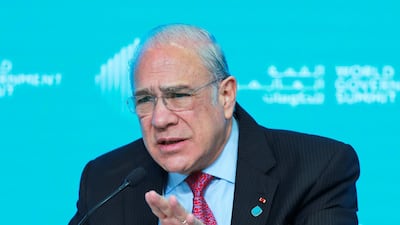The global economy is going through an investment drought mainly brought about by trade uncertainty, which is causing a steep decline in growth, the secretary general of the Organisation for Economic Co-operation and Development said.
The organisation in Paris is due to release its bi-yearly global economic forecast next week.
At the Paris Peace Forum on Tuesday, Angel Gurria told The National the OECD's latest numbers will confirm slowing global growth and investment.
He said there was a risk that it "could get worse", depending on political decisions made.
He said the four main threats to the global economy were trade tensions, uncertainty around Brexit, the overhang in global debt and a slowdown in China.
Mr Gurria said the OECD was not projecting a global recession now, but if more decisions restricting trade and investment were made, it could "easily" lead to negative growth in some countries.
“In fact, you already have negative or flat growth in some countries such as Germany, the UK and Italy,” he said.
“But France has maintained a better performance mostly because it does not depend so much on trade and foreign investment.
"It is more self-sufficient but the countries that depend on exports and depend on foreign investment are suffering," said Mr Gurria.
In the first half of 2018, the World Trade Organisation forecast global trade growth to be about 5.5 per cent, but since trade tensions intensified, that number has drastically reduced.
Mr Gurria said the tensions went beyond that between the US and China. It was also within the European motor industry and between Japan and Korea over exports of high-tech materials.
The WTO now expects global trade to grow at 1.2 per cent this year, but Mr Gurria said that might be too optimistic.
“Frankly, for this to happen it would need to have a very big jump in the last quarter and that is not happening,” he said.
Mr Gurria said the OECD, which represents 36 global economies including Britain, was "almost discarding" the possibility of a no-deal Brexit.
Such a scenario had looked likely but since the UK's departure deadline was shifted from October to January and members of parliament passed legislation against leaving without a deal, no-deal now looks less probable.
Mr Gurria dismissed the idea of the UK becoming more deregulated and a lower tax environment after it leaves the bloc.
“You can't run a financial centre the size of London and not be in line with best practices internationally," he said.
"I expect the UK to continue to actively and constructively participate in these discussions and to be a part of the final solution where by January, we expect to have all the elements, and by June, we expect to have a very clear road map.”
Mr Gurria said Brexit would lead to slowing investment and hurt household income, but the OECD was working with the EU and UK to make its departure as seamless as possible.
Meanwhile, on a panel on the future of trade at the Paris Peace Forum on Tuesday, Alan Wolff, deputy director general of the WTO, said the international body needed to reform to be more inclusive of poorer countries prone to conflict to help them achieve stability.
“We need leadership in the WTO," Mr Wolff said. "We are missing it in a major way.
"It means Brussels, Washington, Beijing, but also we are seeing middle countries stepping forward.
"Australia and Singapore have been very active on electronic commerce."

